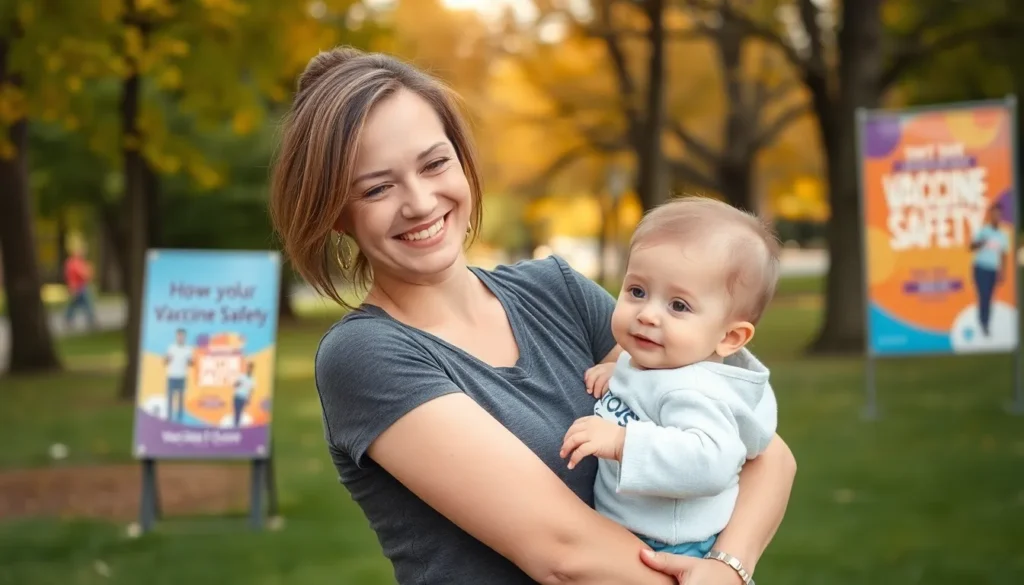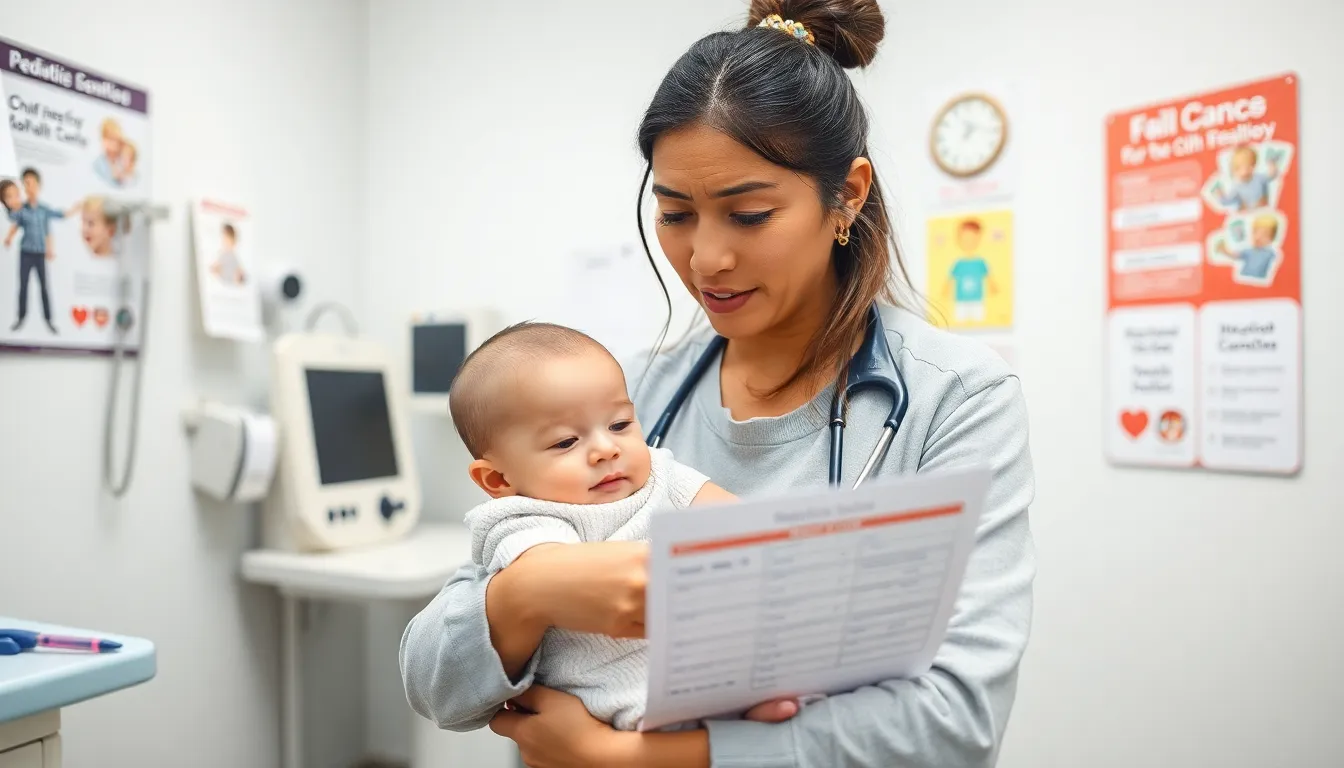In a world where parenting often feels like a game show with no instruction manual, ensuring a baby’s health can be a daunting challenge. Enter baby vaccine awareness campaigns—the superheroes of public health, armed with knowledge and a splash of humor. These campaigns aim to clear up the confusion surrounding vaccinations, making it easier for parents to protect their little ones from preventable diseases.
Imagine a world where parents are armed with facts instead of fears, where they can confidently say “yes” to vaccines without breaking a sweat. With catchy slogans and relatable content, these campaigns not only educate but also entertain, turning the daunting task of vaccination into a fun family outing. By spreading awareness, they help parents make informed choices, ensuring that every baby gets a fighting chance against illness. After all, a healthy baby is a happy baby, and who doesn’t want that?
Table of Contents
ToggleOverview of Baby Vaccine Awareness Campaigns
Baby vaccine awareness campaigns play a critical role in public health. These initiatives aim to educate parents about the importance of vaccinations for their infants. Promoting accurate information helps dispel myths surrounding vaccines. Campaigns often use relatable humor to engage families and build trust.
These programs focus on the realities of vaccine-preventable diseases. With clear messaging, they highlight the risks associated with not vaccinating. Parents gain access to necessary resources, empowering them to make informed choices. Successful campaigns ensure that the public understands the role of vaccines in safeguarding children’s health.
Mobile-friendly websites and social media platforms are commonly used to spread awareness. Engaging content captures attention, leading to increased information retention. Educational materials include infographics, videos, and articles that simplify complex vaccine information. Interactive components, such as quizzes, enhance engagement.
Health organizations often collaborate with community leaders for effective outreach. Events and workshops provide opportunities for families to ask questions and receive guidance. Personalized reminders for vaccination visits promote timely immunization.
Statistics indicate that regions with active awareness campaigns experience higher vaccination rates. In many areas, campaigns cut misinformation by a significant margin, leading to healthier communities. Since prevention is key, these initiatives contribute to reducing disease outbreaks and ensuring the well-being of future generations.
Importance of Baby Vaccination
Vaccinations play a crucial role in a child’s health and development. Awareness campaigns inform parents about the significant benefits of vaccinating their infants.
Benefits of Vaccination
Vaccination protects infants from serious diseases such as measles, mumps, and rubella. These diseases can lead to severe complications, including hospitalization and long-term health issues. Research indicates that vaccinated children demonstrate fewer instances of these preventable illnesses. Immunization contributes to herd immunity, which protects vulnerable populations unable to be vaccinated. Engaging in these campaigns increases awareness about the schedule of vaccinations, making sure parents understand their importance. Empowered parents make informed choices, leading to healthier communities. Statistics point to a direct correlation between vaccination rates and lower disease prevalence, reflecting the success of these initiatives.
Risks of Not Vaccinating
Not vaccinating infants exposes them to various infectious diseases. Measles, for example, can cause pneumonia, encephalitis, and even death. Outbreaks of vaccine-preventable diseases occur more frequently in unvaccinated populations. Parents may encounter misinformation that contributes to vaccination hesitancy, leading to increased health risks for their children. Unvaccinated children are not only a liability to their health but also to the health of others. Increasing awareness campaigns addresses these misconceptions, promoting education around the dangers of skipping vaccinations. Data shows that regions with lower vaccination rates experience higher rates of outbreaks, underscoring the necessity of timely immunizations.
Effective Strategies for Awareness Campaigns
Effective awareness campaigns utilize various approaches, ensuring parents receive valuable information about baby vaccinations.
Social Media Outreach
Social media platforms serve as key tools for reaching parents. Campaigns use targeted ads to share relevant content about vaccines. Engaging posts featuring testimonials, infographics, and educational videos attract attention. These formats promote user interaction, facilitating discussions and answering questions in real-time. Regular updates keep the information fresh and encourage shares, expanding the campaign’s reach. Analytics track engagement levels, allowing campaigns to refine their strategies in response to audience preferences. Consistent messaging across platforms reinforces the importance of vaccinations and combats misinformation effectively.
Community Engagement
Community engagement fosters personal connections with families. Local events offer direct interaction with healthcare professionals, enabling parents to ask questions and receive expert advice. Information sessions in schools or community centers enhance outreach efforts, promoting informed decision-making. Partnering with local organizations enhances credibility and outreach. Events like vaccination drives encourage timely immunization, making access easier for families. Engaging local leaders or influencers can amplify messages, reaching broader audiences. Overall, active participation in the community supports vaccine awareness and encourages parental involvement in safeguarding children’s health.
Case Studies of Successful Campaigns
Effective baby vaccine awareness campaigns have demonstrated significant impact in various regions and by numerous organizations. These initiatives showcase innovative approaches to raise awareness and educate parents.
Campaign in California
In California, the “Vaccinate and Protect” campaign achieved remarkable results through community partnerships. Collaborations with local healthcare professionals helped establish trust among parents. Utilizing social media platforms to share compelling stories and data, they effectively reached diverse audiences. Community events offered families opportunities to ask questions and engage one-on-one with experts. Statistics from the campaign indicated a notable increase in vaccination rates, illustrating how targeted outreach can lead to improved public health outcomes.
Campaign by the World Health Organization
The World Health Organization’s “Immunization Saves Lives” initiative represents a comprehensive approach to fighting vaccine misinformation. This global campaign utilizes diverse communication channels to educate parents on the benefits of vaccination. Infographics and video content highlight the dangers of preventable diseases effectively. Engaging in partnerships with national health departments helped spread the message strategically. Data reflects an increase in immunization rates across multiple countries, showcasing the potential of large-scale campaigns to enhance child health worldwide.
Challenges and Barriers to Awareness
Various challenges hinder the effectiveness of baby vaccine awareness campaigns. Understanding these barriers is essential for enhancing outreach and education efforts.
Misinformation and Myths
Misinformation surrounding vaccines presents a significant challenge. False claims about vaccine safety and efficacy circulate widely, leading to fear and hesitation among parents. Social media amplifies these myths, making it difficult for accurate information to emerge. Campaigns often work to debunk these misconceptions, emphasizing scientific evidence. Collectively, these steps help clarify the importance of timely vaccinations. Clarity in messaging becomes crucial when addressing parents’ concerns. Repeatedly providing facts about vaccine benefits fosters trust in health initiatives.
Access and Equity Issues
Access to vaccinations remains a barrier for many families. Low-income communities experience disparities in healthcare, impacting vaccination rates. Geographic location can limit access to clinics offering vaccines, especially in rural areas. Transportation challenges further exacerbate these issues. Additionally, cultural factors may influence parents’ willingness to vaccinate. Awareness campaigns must consider these diverse needs to reach all families effectively. Partnerships with local organizations can facilitate better access to vaccination services, bridging gaps in healthcare equity. Regular outreach initiatives help ensure that every child receives the protection they deserve.
Conclusion
Baby vaccine awareness campaigns are vital in safeguarding children’s health and promoting informed decision-making among parents. By utilizing relatable content and engaging platforms, these initiatives effectively combat misinformation and highlight the risks of not vaccinating.
Through community partnerships and targeted outreach, they foster trust and ensure that diverse needs are met, especially in underserved areas. As these campaigns continue to evolve, their impact on vaccination rates and overall public health will remain crucial. Investing in these awareness efforts not only protects individual children but also strengthens community health for future generations.











